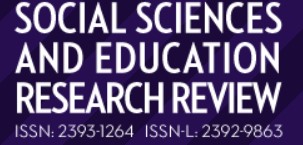EFFECT OF COMPUTER GAMES INSTRUCTIONAL STRATEGY ON SECONDARY SCHOOL STUDENTS’ ACHIEVEMENT AND GENDER IN DATA PROCESSING IN OGIDI EDUCATION ZONE
EFFECT OF COMPUTER GAMES INSTRUCTIONAL STRATEGY ON SECONDARY SCHOOL STUDENTS’ ACHIEVEMENT AND GENDER IN DATA PROCESSING IN OGIDI EDUCATION ZONE
Author(s): JohnBosco O.C. Okekeokosisi, Marcellinus Chibueze Anaekwe, Esther E. Akachukwu, Kaptani Yusuf AtiuSubject(s): Gender Studies, School education, ICT Information and Communications Technologies, Sociology of Education
Published by: Editura Sitech
Keywords: Computer games instructional strategy (CGIS); achievement; gender;
Summary/Abstract: This study explored the effect of computer games instructional strategy on secondary school students’ achievement and gender in Data processing. Two research questions and three hypotheses guided the study. The design was quasi-experimental. The population comprised of all senior secondary school one (SS1) students of 2021/ 2022 academic session offering data processing as one of the technical, vocational, education and training subjects as recommended and approved by FRN (2013) in her National Policy on Education. The sample was 288 students offering data processing data processing (164 males and 124 females) drawn from four schools through simple random sampling technique. The experimental groups (152 students; 88 males and 64 females) were taught using Computer Games Instructional Strategy (CGIS) while the control groups (136 students; 76 males and 60 females) were taught using the conventional method. The intact classes were assigned to treatment and control through balloting technique. Computer Games Instructional Manual (CGIM) and Achievement Test on Data Processing (ATODP) were the instruments used, which were given to two experts for perusal to ascertain their validity. Reliability index of 0.82 was obtained for the ATODP using Kuder-Richardson formula (K-R 20). The research questions were answered using mean with standard deviation while the null hypotheses were tested with Analysis of Covariance. Results showed that the CGIS enhanced students’ academic achievement in Data processing better than the conventional method. Also, there was no significant effect of gender on students’ academic achievement in data processing better than the conventional method. Based on the findings, the researcher recommended among others that data processing teachers should utilize the CGIS in their lesson deliveries to enhance higher academic achievement of the students.
Journal: Social Sciences and Education Research Review
- Issue Year: 10/2023
- Issue No: 1
- Page Range: 218-224
- Page Count: 7
- Language: English

